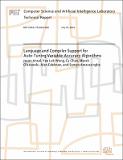Language and Compiler Support for Auto-Tuning Variable-Accuracy Algorithms
Author(s)
Ansel, Jason; Wong, Yee Lok; Chan, Cy; Olszewski, Marek; Edelman, Alan; Amarasinghe, Saman; ... Show more Show less
DownloadMIT-CSAIL-TR-2010-032.pdf (511.5Kb)
Other Contributors
Computer Architecture
Advisor
Saman Amarasinghe
Metadata
Show full item recordAbstract
Approximating ideal program outputs is a common technique for solving computationally difficult problems, for adhering to processing or timing constraints, and for performance optimization in situations where perfect precision is not necessary. To this end, programmers often use approximation algorithms, iterative methods, data resampling, and other heuristics. However, programming such variable accuracy algorithms presents difficult challenges since the optimal algorithms and parameters may change with different accuracy requirements and usage environments. This problem is further compounded when multiple variable accuracy algorithms are nested together due to the complex way that accuracy requirements can propagate across algorithms and because of the resulting size of the set of allowable compositions. As a result, programmers often deal with this issue in an ad-hoc manner that can sometimes violate sound programming practices such as maintaining library abstractions. In this paper, we propose language extensions that expose trade-offs between time and accuracy to the compiler. The compiler performs fully automatic compile-time and install-time autotuning and analyses in order to construct optimized algorithms to achieve any given target accuracy. We present novel compiler techniques and a structured genetic tuning algorithm to search the space of candidate algorithms and accuracies in the presence of recursion and sub-calls to other variable accuracy code. These techniques benefit both the library writer, by providing an easy way to describe and search the parameter and algorithmic choice space, and the library user, by allowing high level specification of accuracy requirements which are then met automatically without the need for the user to understand any algorithm-specific parameters. Additionally, we present a new suite of benchmarks, written in our language, to examine the efficacy of our techniques. Our experimental results show that by relaxing accuracy requirements, we can easily obtain performance improvements ranging from 1.1x to orders of magnitude of speedup.
Date issued
2010-07-27Series/Report no.
MIT-CSAIL-TR-2010-032